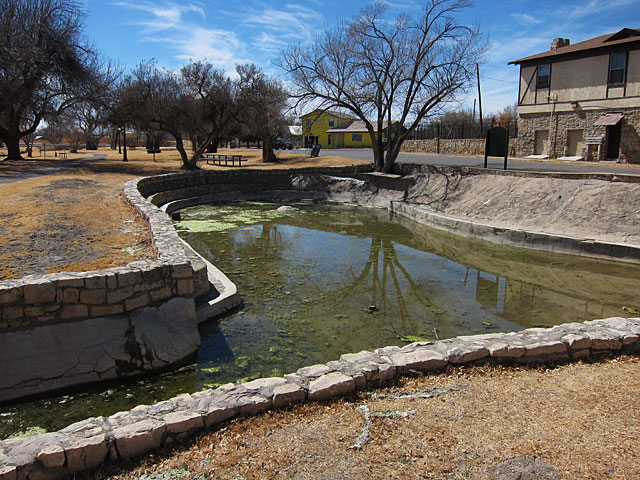Alert Gazette readers may recall this post from almost two years ago, where I tracked down and photographed the elusive flow of Comanche Springs in Fort Stockton. To my knowledge, that was the last time the springs flowed, thanks to a combination of drought and continued heavy irrigation in the Belding Draw area just west of town.

The region has had some fairly heavy rainfall over the past few weeks, but I haven’t been down there to see if the springs are flowing. But we haven’t seen any reports of flow in the local newspaper, and that phenomenon usually makes the front page.
So why bring this up? Well, I received an email yesterday from someone who ran across that post and wants to use some of my photos in an intriguing project entitled Our Desired Future. The accompanying website describes it as “a multimedia project to educate Texans on the interdependence of our groundwater, springs and rivers,” with a stated goal “to inspire Texans to bring about the changes needed to keep waters flowing for future generations.”
This is a laudable goal, and as far as I can tell, there’s no hidden agenda. The material on the website presents a balanced look at the often-conflicting motivations of the various stakeholders in our state’s water resources, and it effectively presents the dilemmas via stories, anecdotes, interviews, etc. with the goal of helping us understand the nature and magnitude of the problems, which unfortunately seem to have no easy answers.
Regardless, it was interesting to see that the first report focused on something going on in the aforementioned Belding Draw area of Fort Stockton, where Clayton Williams, Jr’s son is undertaking something quite unfamiliar to West Texans: rice farming.
I don’t have the time or energy (or knowledge) to explain the complex issues, although the story does a pretty good job of at least skimming the surface. But I do want to weigh in on something that the article touches on, and that’s the idea that even if water can’t be exported in liquid form straight from the source, it is still being exported in the form of crops. From this perspective, rice farming in arid West Texas is a bit of a provocative political statement. Jeff Williams, the farmer, admits that it’s not logical, but he says that his family isn’t being allowed to sell their water via pipeline so they’re doing so via water-intensive crops such as rice and alfalfa (along with something called teff grass). And he wonders why there’s a difference in the way the two are perceived.
Again, I’m not qualified to describe, much less assess, the legal issues involved, but I feel confident that there’s at least one perceptual factor that muddies the waters, pun intended, and that’s the perceived value of the potential uses for water that might be sold to someone else. It’s pretty easy to make a case that using water to grow food is an entirely different endeavor than selling water for use in filling swimming pools or irrigating private landscaping comprised of non-native grasses, trees and shrubs that probably should never have been planted in the first place. We can argue about whether the latter uses are as economically valuable as the former, and in both cases the water is taken from its source and consumed, but I’m sure that most people will have an emotionally-charged preference.
The only quibble I have with the article itself is the statement that 35 million gallons of water can be pumped from the aquifer underlying Belding Draw every day and “still leave room to spare.” The data I’ve seen varies depending on the agenda of those who paid for it, leading me to believe that no one really knows for sure, and no one can predict with certainty what will happen to that aquifer if the current drought persists and worsens. If this sounds like something you’ve heard me say before, you have a great memory.
As I mentioned at the top, Our Desired Future has some lofty and worthwhile goals. If you’d like to provide some financial support to help the team execute their plans, their website tells you how to do that.
Discover more from The Fire Ant Gazette
Subscribe to get the latest posts sent to your email.
